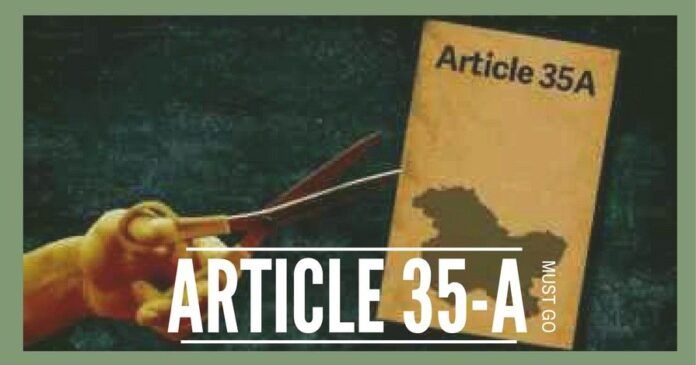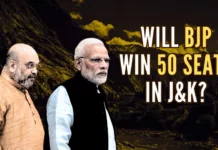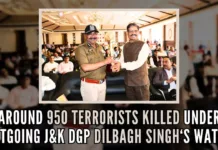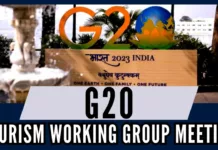
If Article 35A goes, a lot of Kashmir leaders will be jobless
Article 35-A of the Indian Constitution has changed the political scene of Jammu & Kashmir (J& K) in a most dramatic manner. It also has triggered a fierce debate across the nation on whether it should be retained or repealed.
Ambedkar had said: “I can’t be a party to such an act of betrayal of the national interest. I am Law Minister of India…” (Article 370 is temporary provision.)
On the one hand, the demand seeking abrogation of Article 35-A is keeping Kashmiri Muslim leaders of all hues and Kashmiri Muslim civil society groups awake at night. The general view in the now almost one-community Kashmir is that the abrogation of Article 35-A would mean at least four things.
One, the abrogation would erode the special status of the state that it has been enjoying since October 1949, when Article 306-A (370) was adopted by the Indian Constituent Assembly despite the opposition from the Chairman of the Constituent Assembly, BR Ambedkar. Ambedkar had said: “I can’t be a party to such an act of betrayal of the national interest. I am Law Minister of India…” (Article 370 is temporary provision.)
Two, it will change the demography of Kashmir as the abrogation would enable non-state subjects to acquire immovable property in Kashmir and settle there.
Three, it would enable non-state subjects to obtain government jobs and also enable wards of non-state subjects to avail of the state-sponsored scholarship facilities.
And Lastly, it would establish parity between the permanent residents of the rest and the rest of the Indians.
To be more precise, Kashmiri Muslims want continuation of the regime that considers them a race apart and all others aliens
The people of Jammu and Ladakh, who constitute population equal to Kashmir, if not more, and who occupy over 88 per cent of the state land area, want Article 35-A to go lock, stock and barrel
The Kashmiri Muslim leaders, without exception, warn the Union Government that there would be bigger violence in Kashmir and there will be no one in the Valley to give a shoulder to the national flag if Article 35-A was tinkered with. So much so, they are warning that the abrogation of Article 35-A will reopen the whole issue of accession of the state with India. (Neither Article 370 nor Article 35-A has anything to do with the accession process. Accession took place on October 26, 1947, Article 370 was applied on January 26, 1950, and Article-35-A applied to the state through Presidential Order on May 14, 1954.)
On the other hand, the people of Jammu and Ladakh, who constitute population equal to Kashmir, if not more, and who occupy over 88 per cent of the state land area, want Article 35-A to go lock, stock, and barrel.
The upshots of their whole argument are also four.
One, J& K is an integral part of India and, hence, all Indians must exercise all rights in J& K like the permanent Residents of the state exercise all rights all over India.
Two, Kashmiri Muslim leadership has exploited Article 35-A to the hilt and grabbed over 2 lakh canals of state and forest land in Jammu and changed its demographic composition for ulterior motives. If Article 35-A is not repealed, the Kashmiri leadership in alliance with Kashmiri bureaucracy, revenue magistracy and police department will grab the remaining state and forest land in Jammu and convert it into Kashmir to promote the separatist cause.
Three, it was because of Article 35-A that the Hindu-Sikh refugees from Pakistan living in different parts of Jammu were denied the citizenship rights. These Hindus and Sikhs migrated to Jammu from the adjoining Sialkot area (now in Pakistan) in 1947 to save their dignity, lives, and culture.
Four, equally important, argument of the people of Jammu and Ladakh is that Article 35-A has violated the human rights of the daughters of the state. It has limited their choice of marriage.
If any daughter marries a permanent resident of the state, then her children could exercise all the citizenship rights which are available under Article 35-A. In case she marries a nonpermanent resident of the state, her children and husband cannot enjoy the right to vote; right to immovable property in the state; right to higher, technical and professional education in the state-run and state-funded institutions; right to bank loan; right to state government job; and right to contest any election whatsoever.
The fact that the Supreme Court hinted at the possibility of transferring the case to five-judge constitutional bench did accord legitimacy to the plea that Article 35-A was an interpolation and must be done away with
Such children are considered by the J& K Government “illegitimate” and it is for this reason that one daughter of the state Charu Wali Khanna approached the Supreme Court on August 8 to seek justice for her children. In fact, she intervened, as a Public Interest Litigation (PIL) on this subject was already under the consideration of the apex court. The PIL was filed by an NGO “We the Citizens” more than two years ago. It said that Article 35-A was a fraud committed by the Nehru Government on the Indian nation. Article 35-A is unconstitutional and, hence, it must be declared unconstitutional was the refrain and fundamental argument of the petitioner.
The Supreme Court on August 14 hinted that the whole case could be referred to a five-judge constitutional bench. At present, the three-judge bench is hearing this crucial PIL.
The argument of the petitioner is very valid for the simple reason that Article 35-A was never discussed in the Parliament. In other words, the Nehru Government bypassed the Parliament and used an executive route to apply Article 35-A to J& K. It is also not part of the main body of the Constitution. It finds mention only in an appendix.
The constitutional position under Article 368 is that not even one word can be added to or deleted from the Constitution without the approval of both the Houses of Parliament. The fact that the Supreme Court hinted at the possibility of transferring the case to the five-judge constitutional bench did accord legitimacy to the plea that Article 35-A was an interpolation and must be done away with.
The mood of the nation is: Repeal both Articles 370 and 35-A and integrate J&K into India completely
Interestingly, the PDP-BJP coalition government in J& K and BJP Government at the Centre are pulling in different directions. The state government has told the Supreme Court that Article 35-A was a settled issue and it is a permanent feature. It has filed an affidavit to this effect.
Contrarily, the Union Government has not filed any affidavit. It has told the apex court that the matter is “sensitive” and it “requires a wider debate”. Muslim leadership has termed the Union Government’s approach as questionable. It has said that New Delhi was following the judicial route to end the state’s special status.
This is the situation. Jammu and Ladakh are face to face with Kashmir and vice-versa. Kashmir is face to face with New Delhi. Article 35-A has to go. What will happen in Kashmir, if abrogated? There could be the strike for two to three days. Then what? After all, when was Kashmir before and after 1947 not in revolt? India is a state and genuine states do take nation-building decisions. The mood of the nation is: Repeal both Articles 370 and 35-A and integrate J& K into India completely.
Note:
1. The views expressed here are those of the author and do not necessarily represent or reflect the views of PGurus.
- ‘Kashmir My core constituency’: Revisiting July 12, 2003 to understand politics, Omar Abdullah-style - March 15, 2024
- Total deviation from traditional approach: Seven takeaways from PM Modi’s March 7 Srinagar visit - March 9, 2024
- Status of political parties: Why is further J&K reorganization imperative? - March 1, 2024











It is time to show these Muslims their place by abrogating the article 35-A & 370 immediately.
So, if the Hindus of Jammu and the Buddhists of Ladakh together constitute the half the population of their state, and their political aspirations are opposite of the muslims vis-a-vis india, how come we don’t see in daily news channels the views of their leaders as often and as prominently as the views of the Muslim leadership?
It seems to me the Hindus and the buddhists there prefer to leave it all to the “outsider” Hindus of India.
Political dynamics requires that the Hindus and the Buddhists must streamline their political cause and show credible leadership for it. The goi must provide top security to such movement.
Like anything else the PANGOLIN*s did, the CONSTITUTION is all about “Divide to Rule” (Reservations) and “Shake the Pagoda Tree” (Extortion)
*Note: PANGOLIN: An enemy of India who believes in inequality under law, exceptions to the rule of law and persecution of some for the benefit of others. At present, the sole purpose of the Indian Republic, Constitutional or otherwise, is to pamper and provide for certain constitutionally preferred sections of society who the British found useful to hold and exploit India at the cost of those who the British hated and persecuted. The Pangolin is a creature that is unique to India and feeds on ants that are known in nature to be industrious and hard working if not quite as fruitful as bees who flee to better climes. (PANGOLIN is an acronym for the Periyar-Ambedkar-Nehru-Gandhi-Other (alien) Religions-Communist Consensus that usurped the British Mantle and has worn it with elan to loot, plunder, and rape India since 1921 and re write History and laws to their exclusive benefit since 1947)